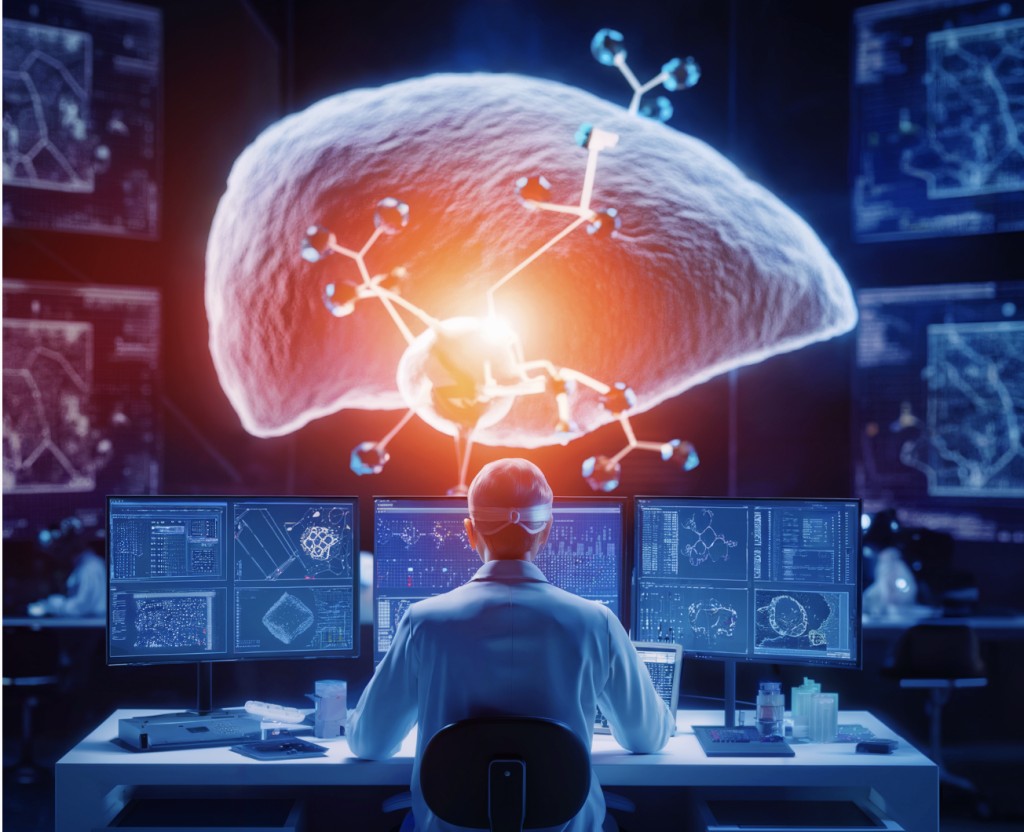Accelerating Drug Discovery with AI: The Role of AlphaFold in Targeting Liver Cancer:
AI is significantly transforming the field of drug discovery, offering new ways to design and synthesize medicines more efficiently. A notable example is AlphaFold, an AI program developed by DeepMind, which has made groundbreaking advancements in predicting the three-dimensional structures of proteins. In 2020, AlphaFold successfully predicted the structures for almost the entire human genome, providing a crucial tool for understanding protein functions and their implications in diseases. This achievement marks a milestone in structural biology, enabling researchers to explore the interactions of unknown proteins and accelerate the discovery of drugs.
A recent study published in Chemical Science highlights the first successful application of AlphaFold in the early stages of drug discovery. The research, led by a global team from the University of Toronto, Stanford University, and Insilico Medicine, utilized AlphaFold’s predicted structures to identify a promising hit molecule for treating hepatocellular carcinoma (HCC), a prevalent form of liver cancer. Combining AlphaFold with AI-powered platforms, PandaOmics and Chemistry42, the team rapidly identified and optimized a potent small molecule inhibitor for cyclin-dependent kinase 20 (CDK20), a protein linked to HCC. This innovative approach significantly reduced the time and cost traditionally required for drug development.
Target Selection and Identification for Hepatocellular Carcinoma Using AI:
HCC is a form of liver cancer and a major global health concern, accounting for 75% of liver cancer cases and leading to high mortality rates. Significant unmet medical needs persist despite advancements like the PD-L1 inhibitor atezolizumab combined with bevacizumab. Utilizing the AI-driven platform PandaOmics, researchers analyzed extensive datasets and used multimodal deep learning to identify and rank potential therapeutic targets for HCC. CDK20 emerged as a promising candidate due to its strong association with HCC and lack of existing experimental structures, making it ideal for AI-powered drug discovery through the Chemistry42 platform.
CDK20 as a Promising Target for Cancer Treatment:
CDK20, also known as cell cycle-related kinase (CCRK), plays roles in cell cycle regulation and other functions across many human tissues. It is notably overexpressed in several cancers, including HCC, colorectal, lung, and ovarian cancers. Research has linked CDK20 to tumor progression through mechanisms such as enhancing cell cycle progression and modulating immune responses. These attributes make CDK20 a valuable therapeutic target, particularly in HCC. Leveraging AI platforms like Chemistry42 and AlphaFold, researchers can generate novel inhibitors, even without experimental 3D structures, as demonstrated by recent discoveries of potent CDK20 inhibitors.
Target Identification and Proposal:
The PandaOmics platform identified potential targets for HCC, focusing on proteins with structures predicted by AlphaFold2. Data from 10 experiments covering 1133 diseases and 674 healthy samples were analyzed. Targets were filtered for druggability by small molecules, novelty, and absence from recent clinical trials or existing drugs. They were binding affinity and activity assays for CDK20 that utilized HEK-293 cells, affinity beads, and radiometric protein kinase assays. Compounds were tested across various concentrations, and IC50 values were calculated. Huh7 and HEK293 cells were treated with different compound concentrations, and cell viability was measured using a chemiluminescence assay after a 3-day incubation. Results were analyzed using GraphPad Prism software.
AI-Powered Drug Discovery Advances with AlphaFold:
Insilico Medicine integrated AlphaFold’s protein structure predictions into their Pharma.AI platform, leveraging PandaOmics for target identification and Chemistry42 for molecule generation. Within 30 days of target selection, they identified a target pathway for HCC and synthesized a hit molecule without an experimentally determined structure. Subsequent AI-driven compound optimization led to the discovery of a more potent inhibitor. This achievement underscores AI’s transformative impact on drug discovery, accelerating processes traditionally hindered by time and cost constraints. Experts like Nobel laureate Michael Levitt highlight AI’s potential to revolutionize healthcare by expanding disease-targeting capabilities. At the same time, innovations like self-driving laboratories promise further advancements in molecular and material discovery.
Rapid Identification and Optimization of CDK20 Inhibitors Using AlphaFold Predictions:
AlphaFold-predicted protein structures facilitated the rapid discovery of CDK20 inhibitors through an integrated AI-driven drug discovery approach. Initially, seven compounds were synthesized and evaluated, with ISM042-2-001 showing a modest binding affinity and selectivity profile. Subsequent rounds of AI-guided compound generation, within a remarkable 30-day timeframe, yielded ISM042-2-048 as a significantly improved inhibitor with enhanced binding affinity (Kd = 566.7 ± 256.2 nM) and potent CDK20 kinase inhibition (IC50 = 33.4 ± 22.6 nM). ISM042-2-048 demonstrated selective anti-proliferative effects in CDK20-overexpressing HCC cells, indicating its potential as a targeted therapeutic agent. Ongoing efforts include further optimization and comprehensive evaluation of ADME properties and kinase selectivity, highlighting the transformative role of AlphaFold in accelerating novel drug discovery efforts.
Sources:
https://pubs.rsc.org/en/content/articlelanding/2023/sc/d2sc05709c
The post Leveraging AlphaFold and AI for Rapid Discovery of Targeted Treatments for Liver Cancer appeared first on MarkTechPost.
Source: Read MoreÂ

